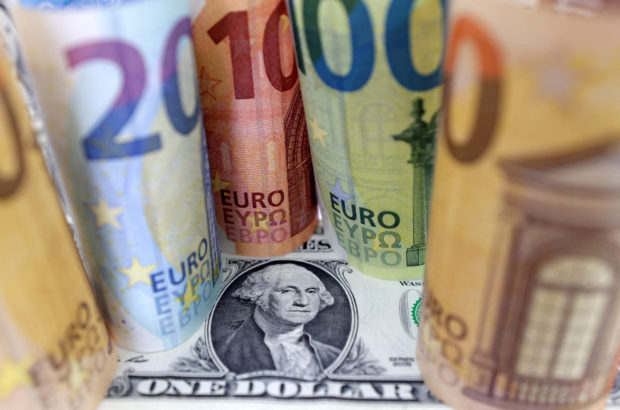Dollar eases as inflation in focus, BOJ governor nomination awaited

U.S. Dollar and Euro banknotes are seen in this illustration taken July 17, 2022. REUTERS/Dado Ruvic/File photo
SINGAPORE – The dollar treaded water on Tuesday as investors braced for an highly anticipated inflation report, while the yen strengthened ahead of the expected announcement of surprise pick Kazuo Ueda as the next Bank of Japan governor.
Markets are looking to the U.S. consumer price index (CPI) data for further clues on Federal Reserve’s policy outlook, with the headline number expected to rise 0.5 percent in January, according to a Reuters poll, after falling 0.1 percent in December.
The dollar index, which measures the U.S. currency against six major rivals, eased 0.019 percent to 103.17, having slipped 0.34 percent overnight. The index is up 1 percent for the month of February.
“There are tentative signs that U.S. inflation is cooling … (but) there is a limit on how low underlying inflation can go while services inflation is still very high,” said Kristina Clifton, a senior economist at Commonwealth Bank of Australia.
Clifton said services inflation, which is strongly linked to wages growth, has shown no signs of softening, adding that a cooling in the labour market will be required for that to occur.
“While the labour market remains tight and wages growth very strong there is the risk that we receive upside surprises on the underlying inflation figures,” she said.
The Federal Reserve earlier this month raised interest rates by 25 basis points but said that it was turning the corner in its fight against inflation.
The euro was up 0.1 percent to $1.0731, having risen 0.435 percent the previous session. Sterling was last trading at $1.2149, up 0.12 percent on the day, after rising 0.6 percent.
The Australian dollar added 0.04 percent to $0.697, while the kiwi rose 0.25 percent to $0.637.
New BOJ governor
Investors are also awaiting the formal nomination for the next Bank of Japan governor. Sources told Reuters that Japan’s government was likely to appoint academic Kazuo Ueda as the next BOJ governor.
Ueda, a former BOJ policy board member and an academic at Kyoritsu Women’s University, is considered an expert on monetary policy but had not even been seen as a dark horse candidate for the top job.
Rodrigo Catril, a currency strategist at National Australia Bank, said Ueda is regarded as a sensible choice as he is not a fully committed “uber dove” and he should have more flexibility as an outsider.
“Notably too, at least on record, he would seem more willing to consider alternative ways of thinking.”
The Japanese yen strengthened 0.23 percent to 132.12 per dollar, having slipped 0.7 percent in the previous session.
The yen dropped sharply last year to a 32-year low of 151.94 per dollar as U.S. rates rose and Japanese rates stayed near zero, but it has since recouped those losses as the Fed looks to pause its tightening while speculation increase that the BOJ will move away from its ultra-loose policy.
Data on Tuesday showed Japan’s economy averted recession but rebounded much less than expected in October-December as business investment slumped, meaning an exit from stimuls will prove a challenge for the BOJ.
“We believe that the modest recovery will continue this year, but today’s data support the Bank of Japan’s argument that the recovery is still fragile and that easy monetary policy is needed,” ING economists said in a note.
“The incoming new governor will find it difficult to start any normalization.”